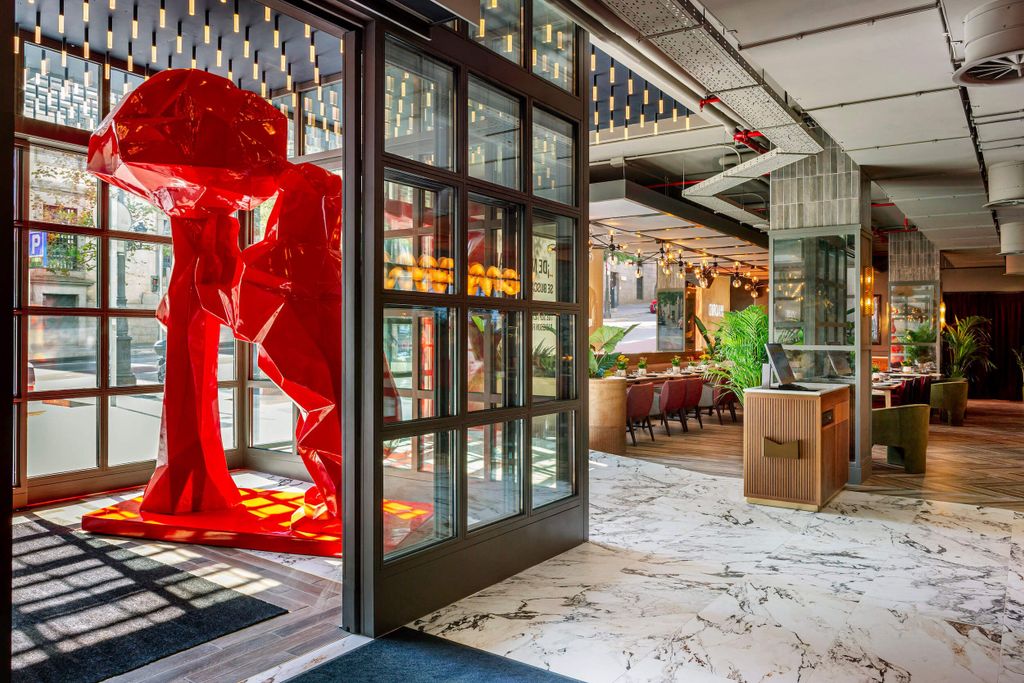On the customer side, 83% of those surveyed for the latest Booking report confirm that travelling more sustainably is important to them, and 75% of travellers worldwide say they want to travel more sustainably over the next 12 months[1]
Eco-responsible hotels are not only positioning themselves as more sustainable alternatives, but also as agents of change, positively influencing the tourism industry and creating sustainable models that could be adopted on a wider scale. They show that integrating sustainability can set new standards for the future of tourism.
What is an eco-responsible hotel?
An eco-responsible hotel is one that limits its environmental impact by adopting low environmental impact practices. This often starts with the renovation of its infrastructure and spaces, using sustainable and local materials to reduce the building’s overall carbon footprint and energy consumption.
These hotels also implement environmentally-friendly practices. Water, energy and waste management are optimised to minimise the ecological footprint. For example, the use of rainwater recovery systems, solar panels and selective sorting systems allows for more ecological management of resources.
Raising awareness of environmental issues among customers, staff and suppliers is also essential. Initiatives such as displaying awareness messages and staff training help to create a corporate culture focused on sustainability.
Eco-responsible hotels can also distinguish themselves by obtaining specific labels, such as Green Key certification or the European Ecolabel for tourist accommodation (afnor.org). These labels guarantee that the establishment complies with strict environmental protection and sustainability criteria.
Finally, eco-hotels are designed to be durable and flexible, with mixed-use spaces that meet the different needs of guests. Whether for work, leisure or relaxation, these spaces are designed to be versatile and adapted to a variety of uses. This contributes to a better customer experience, while reducing the need for frequent space transformations.
Eco-responsible hotel and resource conservation
Eco-responsible hotels support the development of a more sustainable tourism model, where guest comfort and respect for the environment go hand in hand.
Among the levers for action, zero waste management is essential. This includes reducing single-use packaging, implementing composting systems for organic waste, and promoting recycling initiatives among guests. These actions help to minimise the hotel’s ecological footprint and encourage more conscious consumption.
At the same time, eco-responsible hotels are tackling the problem of food waste. They adapt the size of buffets, adjust menus according to actual demand, and sometimes work with local organisations to redistribute surplus food. These measures not only reduce the hotel’s environmental impact, but also support local communities by providing them with additional food resources.
In this context, the Accor group stands out as one of the pioneers in the fight against food waste worldwide. Over the coming months, several hundred Accor hotels will be integrating Orbisk’s food waste control system into their kitchens. This technology, which uses artificial intelligence, automatically identifies which ingredients are thrown away, how much and at what time of day. The data is then used to train kitchen teams to use food more efficiently. The first deployment of this system in 10 European hotels has already reduced food waste by 22% in just six months. Projections suggest that this reduction could reach 50% after a year and a half of use, illustrating the effectiveness of such technological initiatives in reinforcing sustainable practices within the hotel industry.
Finally, as part of reducing their carbon footprint, eco-responsible hotels also adopt advanced energy management practices, particularly in the use of air conditioning. These establishments favour air conditioning systems controlled by sensors or access cards, which only operate when rooms are occupied or on demand. This approach minimises energy wastage and reduces costs while maintaining guest comfort.
Promoting a more sustainable tourism model involves adopting environmentally-friendly practices and raising travellers’ awareness of ecological issues. This requires close collaboration between players in the tourism sector, local authorities and customers.
Eco-responsible hotels: a customer expectation
More and more travellers are looking for holidays in environments that are more respectful of the planet. This trend is part of sustainable and responsible tourism. By opting for eco-responsible hotels, customers can minimise their ecological footprint, while still enjoying their stay.
62% of travellers surveyed in the Booking study recognise that they are the best version of themselves when they travel more sustainably[2]
Eco-responsible hotels also offer an authentic and immersive experience of the local culture. These establishments often incorporate elements of regional tradition and know-how, allowing visitors to discover and appreciate the local culture. This type of holiday encourages an enriching exchange between travellers and local communities.
